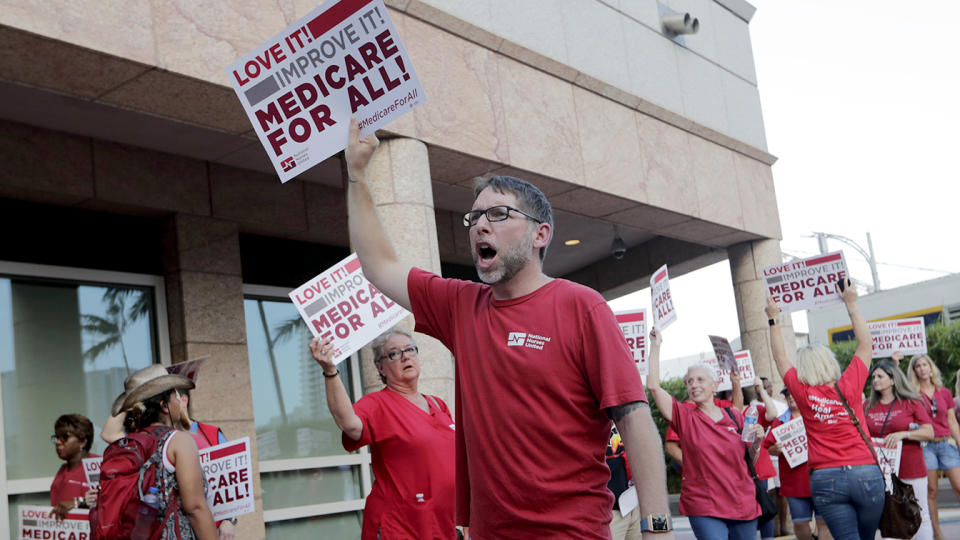Poll: Most Democrats in Super Tuesday states support Medicare for All-style plan
Super Tuesday didn’t go well for progressives: The Bernie Sanders campaign’s goal of expanding the electorate fell short as Joe Biden — the standard bearer of the moderate wing of the party who said Americans aren’t looking for a “revolution” — won a majority of the primaries and took a delegate lead in the race for the Democratic nomination.
But it wasn’t all bad news for those seeking large systemic changes, as CNN exit polling showed that a majority of Democrats in every single state that voted support making the federal government responsible for providing health care. Support ranged from 50 percent exactly (to 45 percent opposed) in Massachusetts up to 73 percent support in Sanders' home state of Vermont, with some of the largest states to vote giving it a clear majority (63 percent in Texas to just 33 percent opposed and 57 percent in California to 36 percent opposed).
This follows trends from the first four states to vote, where the NBC News exit poll question “Do you support a single government health insurance plan for all?” was answered in the affirmative by 57 percent of respondents in Iowa, 58 percent in New Hampshire, 62 percent in Nevada and 50 percent in South Carolina.
The phrasing of the question is important, because Medicare for All polling is very much dependent on how the questions are worded. The various proposals to curb costs and improve care in the United States are confusing. Some respondents think Medicare for All means a public option, where you could retain your private insurance if you wanted or have the option to get a plan from the government. But Sanders and his allies envision a single-payer plan that would effectively end private insurance, replacing premiums, deductibles and co-pays with government outlays, paid for with higher taxes.

Neither exit poll question made that crucial distinction or specified that private insurance would be eliminated. Many other nations that have government health care plans also allow supplemental private insurance.
National polling shows cross-party support for the plan. A February Kaiser Family Foundation poll found 52 percent of Americans supporting "a national health plan, sometimes called Medicare-for-all, in which all Americans would get their insurance from a single government plan.” This is down from polls in recent years. Support peaked at 59 percent in March 2018, when 74 percent of Democrats and 50 percent of independents favored it.
And support for a single-payer plan comes in the face of opposition from many party leaders and widespread skepticism in the media. In nearly every debate, Sanders and Sen. Elizabeth Warren faced questions on how they would pay for their plans, which their rivals attacked as wildly expensive and unrealistic.
Estimates for the cost of the plan are $30 trillion over 10 years, but Sanders maintains that the net cost to Americans would go down overall, in part by eliminating the overhead and profit margins of the insurance industry.
House Speaker Nancy Pelosi said she wasn’t “a big fan” of Medicare for All and told insurance executives last year not to worry about a push for single-payer health care. Senate Minority Leader Chuck Schumer has consistently declined to endorse the plan. There was one voice of support: Former President Barack Obama, who called it a “good idea” in September 2018.
Expanded government health programs face concerted opposition from the health care and insurance industry, whose top lobbyists formed what Politico called an “army” in November. The medical industry’s influence was demonstrated last year when a bill to curb surprise billing stalled in Congress after tens of millions were spent by an alliance of doctors and hospitals backed by private-equity firms.
Biden’s plan calls for a public option to supplement the Affordable Care Act (Obamacare), but not a single-payer system. By the plan’s own admission, it would fail to cover 3 percent of Americans or about 10 million people.
Insurance companies were among those pleased with the Super Tuesday results, as Biden’s victory caused a spike in health insurance stock prices on Wednesday morning. On Monday, health insurers saw their biggest gain in five months after Sen. Amy Klobuchar and former Mayor Pete Buttigieg, two opponents of single-payer, announced they were supporting Biden.
_____
Read more from Yahoo News:



